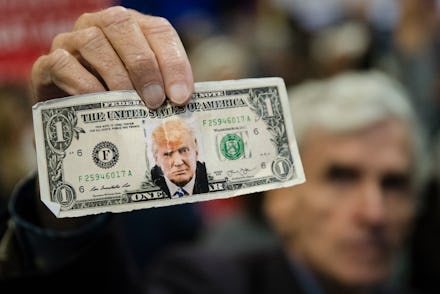Here's why it matters that Donald Trump's administration is one of the richest in history

Despite the populist message of his campaign, President-elect Donald Trump is stocking his administration with millionaires and billionaires, many of whom were born into wealth and attended elite schools.
That matters, and not just because of bad optics — or the fact that Trump lambasted Hillary Clinton on social media for her ties to Wall Street.
First of all, Trump's team is not just rich — it's ultra-rich: As the Washington Post reported on Wednesday, Trump is assembling "the wealthiest administration in modern American history," with picks like commerce secretary Wilbur Ross, a controversial billionaire worth literally 10 times as much as former President George W. Bush's entire Cabinet.
Ironically, back in 2001, Bush was repeatedly dragged for having an administration comprised of wealthy elites.
Now, it's important to remember that not everyone may see the size of Trump's Cabinet's wealth as a bad thing: Many Trump voters cited his business "success" as a reason for supporting him — and if they liked the idea of one rich businessman in office, it follows that they might like the idea of many.
But that's a dangerous attitude, and at least in some cases might reflect the same psychology that causes poorer people to vote for tax cuts for the rich, even if it is against their own interests.
Why?
First, history suggests that business leaders actually do not tend to make effective political leaders — and Trump's mega-rich picks have an unprecedented lack of experience in governance. Second, and perhaps most importantly, a wide body of academic research suggests that as wealth rises, people become less empathetic toward poorer and middle-class folk — and are more likely to move to the right politically.
As the Boston Globe reported in 2012, research indicates that the rich "have a harder time connecting with others, showing less empathy to the extent of dehumanizing those who are different from them," and, all things considered, "our wealthy leaders may be more callous, self-absorbed, and self-justifying than the people they represent."
In one study the Globe found that "a subject whose family income is over $75,000 will show more compassion and generosity than a subject with a family income over $150,000" and that there tends to be a continuum.
Other studies the Globe looked at suggest rich people are less likely to help those in trouble and more likely to defend the "status quo," even if it is unjust.
Of course, for as much as wealth may shape worldview, it's not the only determining factor.
But so far, Trump's choices for his incoming administration have not convincingly demonstrated through past actions that their portrayal as the cartoonish mega-rich is unwarranted.
Betsy DeVos, Trump's choice for secretary of education, has an estimated family net worth of $5.1 billion, according to Forbes, and funded a think tank that advocated bringing back child labor.
Trump's pick for Treasury secretary, Steve Mnuchin, has an estimated net worth of $40 million and co-founded and ran a bank that is currently facing accusations that it discriminated against nonwhite customers, violating federal laws.
Under Mnuchin's leadership, the bank also foreclosed on thousands of homes, and once tried to take away the home of a 90-year-old woman when a payment error left 27 cents of her bill unpaid.